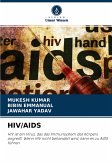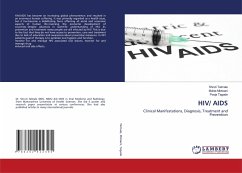HIV is a virus that targets and alters the immune system, increasing the risk and impact of other infections and diseases. It transmits through some body fluids, such as semen, vaginal secretions, and blood. Without treatment, the infection might progress to an advanced stage called AIDS. Due to medical advances, people with HIV and access to quality healthcare very rarely develop AIDS once they have started taking HIV treatment. WHO observe, HIV has become a manageable condition, and many people with HIV have long, healthy lives. The life expectancy of a person with HIV is now approaching that of someone who tests negative for the virus, provided that the person takes medications called antiretroviral therapy on an ongoing basis. As of 2019, around 68% of adults and 53% of children with HIV worldwide were receiving lifelong treatment.
Bitte wählen Sie Ihr Anliegen aus.
Rechnungen
Retourenschein anfordern
Bestellstatus
Storno








